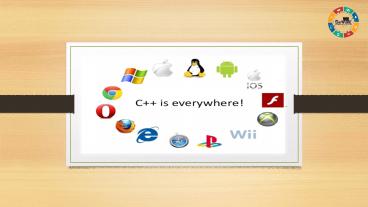Introduction of c++ (1) - PowerPoint PPT Presentation
Title:
Introduction of c++ (1)
Description:
This ppt interduce c++ programming language. With the help of this ppt you know about c++ programming language. In this ppt you know some thinks about c++ like what kind of jobs you have after doing c++ programming language. – PowerPoint PPT presentation
Number of Views:1364
Title: Introduction of c++ (1)
1
(No Transcript)
2
Index
- About C
- Difference between C and C
- History of C
- For Example
- Why we learn C
- Application of C
- Types of Jobs in C
- Career in C
- The Demand for C in the Market
- Advantages of C
3
About C
- C is a general-purpose programming language
that was developed as an enhancement of the C
language to include object-oriented paradigm. It
is an imperative and a compiled language. - C is a middle-level language rendering it the
advantage of programming low-level (drivers,
kernels) and even higher-level applications
(games, GUI, desktop apps etc.). The basic syntax
and code structure of both C and C are the same.
4
Difference between C and C
C C
C is Procedural Language. C is non-Procedural Language i.e. Object Oriented Language.
Top down approach is used in Program Design. Bottom up approach adopted in Program Design
Multiple Declaration of global variables are allowed. Multiple Declaration of global variables are not allowed.
C requires all the variables to be defined at the starting of a scope. C allows the declaration of variable anywhere in the scope i.e. at time of its Frist use.
In C, malloc() and calloc() Function are used for Memory Allocation and free() function for memory Deallocation. In C, new and delete operators are use for Memory Allocation and Deallocation.
5
History of C
- C is a general-purpose programming language. It
was created by Bjarne Stroustrup at Bell Labs
circa 1980. C is very similar to C (invented by
Dennis Ritchie in the early 1970s).
6
For Example
Input
includeltiostreamgt int main() int a10 , b10,
sum sumab coutltltSum of a and b is
Output
Sum of a and b is 20
7
Why we learn C?
- C is used to develop games, desktop apps,
operating systems, browsers, and so on because of
its performance. - After learning C, it will be much easier to
learn other programming languages like Java,
Python, etc. - C helps you to understand the internal
architecture of a computer, how computer stores
and retrieves information.
8
Application of C
- C finds varied usage in applications such as
- Operating Systems Systems Programming.
e.g. Linux-based OS (Ubuntu etc.) - Browsers (Chrome Firefox)
- Graphics Game engines (Photoshop, Blender,
Unreal-Engine) - Database Engines (MySQL, MongoDB, Redis etc.)
- Cloud/Distributed Systems
9
Types of Jobs in C
- Programming Architect
- UNIX Shell Scripting
- Backend Developer
- Embedded Engineer
- Database Developer
- Bioinformatician
- Computational Biologist
- Junior Programmer
- Senior Programmer
- Software Developer
- Quality Analyst
- Game Programmer
- Software Developer Engineer
- C/C Analyst
10
Career in C
- Today, almost every person is at least familiar
with the term C and C programming when it
comes to Computer Science. Even a person from a
non-technical background has heard about these
languages. The establishment of the Information
Technology sector first started with fundamental
languages like C and C.
11
The Demand for C in the Market
- Here is a graphical representation of the demand
for various programming languages in the market.
This graph depicts where the C/C programming
language stands among the various other
programming languages. - It is pretty clear from the graph that Java and
Python are more in demand than C/C in India.
But, it is also important to note that most of
the developers know how to code in C and C.
12
Advantages of c
- Portability
- Object-oriented
- Multi-paradigm
- Low-level Manipulation
- Memory Management
- Large Community Support
- Compatibility with C
- Scalability
13
Samyak Computer Classes
9772271081 Contact_at_digitalsamyak.com WWW.SAMYAKINF
OTECH.COM

